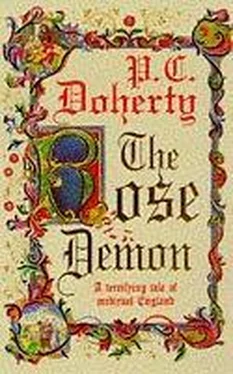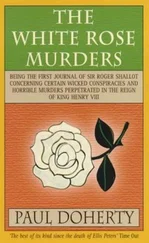Paul Doherty - The Rose Demon
Здесь есть возможность читать онлайн «Paul Doherty - The Rose Demon» весь текст электронной книги совершенно бесплатно (целиком полную версию без сокращений). В некоторых случаях можно слушать аудио, скачать через торрент в формате fb2 и присутствует краткое содержание. Жанр: Исторический детектив, на английском языке. Описание произведения, (предисловие) а так же отзывы посетителей доступны на портале библиотеки ЛибКат.
- Название:The Rose Demon
- Автор:
- Жанр:
- Год:неизвестен
- ISBN:нет данных
- Рейтинг книги:5 / 5. Голосов: 1
-
Избранное:Добавить в избранное
- Отзывы:
-
Ваша оценка:
- 100
- 1
- 2
- 3
- 4
- 5
The Rose Demon: краткое содержание, описание и аннотация
Предлагаем к чтению аннотацию, описание, краткое содержание или предисловие (зависит от того, что написал сам автор книги «The Rose Demon»). Если вы не нашли необходимую информацию о книге — напишите в комментариях, мы постараемся отыскать её.
The Rose Demon — читать онлайн бесплатно полную книгу (весь текст) целиком
Ниже представлен текст книги, разбитый по страницам. Система сохранения места последней прочитанной страницы, позволяет с удобством читать онлайн бесплатно книгу «The Rose Demon», без необходимости каждый раз заново искать на чём Вы остановились. Поставьте закладку, и сможете в любой момент перейти на страницу, на которой закончили чтение.
Интервал:
Закладка:
‘Look!’ he cried, but the hermit had walked away. He was staring at a painting on the far wall. Matthias, curious, ran across, his sandals slapping on the hard paved floor. Matthias gazed at the painting: a beautiful woman, her naked body white as alabaster, hair of spun gold, stood beneath a tree: one hand covered her breasts, the other the secret place between her thighs. She was staring at the figure of a glorious young man clothed in the sun. Olive-skinned, lustrous-eyed, he was holding a rose towards the woman. Matthias noticed it had no thorns. When he looked at the hermit, his friend’s face was tragic and sad, silent tears running down his cheeks. The hermit extended his hands and touched the painted rose, then the beautiful woman. He muttered something Matthias didn’t understand then, folding his arms across his chest, went and sat at the foot of a pillar lost in his own thoughts.
4
The Lancastrian retreat into Tewkesbury had turned into a bloody rout. Most of Margaret of Anjou’s army fled across the open countryside, only to be cut down in the great meadows which stretched down to the Severn. Somerset and the other commanders, Sir Raymond included, decided to seek sanctuary in Tewkesbury Abbey. They had to fight every foot of the way into the town. The Yorkists, moving fast, tried to cut them off in a ring of steel. Sir Raymond fought like a man demented, with all his fury, rage and frustration, not only at the defeat, but in the certain knowledge that he would never fulfil his vow. On the edge of the town they ran into a party of Yorkist horse but the Hospitaller led his companions through. Tying his reins to his belt, Sir Raymond wielded his sword, cutting and slashing at the contorted faces and eager hands ready to pluck him from the saddle. His sword scythed the air, slicing through armour and chain mail, biting deep into bone and flesh. The cobbled streets ran with blood, turning the town into a butcher’s yard. At last they were through, though three of their party were down, two killed, one a prisoner.
By the time they reached the abbey they were splattered in blood from head to toe. Edmund Beaufort, Duke of Somerset, had lost all his hauteur. A weary, dispirited man, he slid from his horse and almost ran through the small door into the abbey nave. He threw his sword on the ground, wrenching off pieces of armour, throwing his bloody gauntlets into the dark transept. Others joined him, not only from his own party but other Lancastrians who knew that the sanctuary of the church was their only refuge and defence against summary execution. The nave began to fill with injured men, some groaning over terrible wounds in their stomachs or shoulders, others seeking news about companions or relations. They cursed Somerset — one even spat in his face — though others took comfort that Wenlock’s cowardice had received its just deserts. Men sprawled about, lying on the floor or resting against the pillars. Sir Raymond stood in the centre of the nave and stared down at the gorgeous rood screen which sectioned off the sanctuary. He knelt, crossed himself, closed his eyes and was halfway through the Ave Maria when he heard the sound of hoofbeats on the cobbled close outside, followed by shouts and yells. One of Somerset’s squires came running into the church, blood seeping from a cut on his left arm.
‘Yorkists!’ he screamed.
The tired Lancastrians picked up whatever weapons they could, forming themselves into a shield wall. A party tried to bar the door but the Yorkist soldiers burst in. The battle began again and the cathedral filled with the sound of scraping steel and the shrieks of wounded and dying men. No quarter was asked and none given. Sir Raymond, with his back to a pillar, fought off two Yorkist bowmen. Their quivers were empty but, armed with spear and sword, they came at him like two wolves snarling and jabbing. Sir Raymond despatched both, one with a thrust to the chest; the other stumbled over his companion’s corpse, and Sir Raymond took his head off like a gardener would snip a rose. The head rolled down the nave whilst Sir Raymond drew away from the blood-gushing, severed neck. The fighting was frenetic. Individual duels and hand-to-hand combat now ranged the whole length of the nave.
Sir Raymond was about to help Somerset when the great bell of the cathedral began to toll. From the sanctuary came a procession of monks led by their abbot carrying his crucifix in one hand, a handbell in the other. He banged the steel cross on the paving stone and began to clang the bell. The sound of fighting died away. Men locked in deadly combat stepped back and stared in awe at the might of the Church. The Abbot was dressed in full pontificals — a gold chasuble inlaid with mother-of-pearl and, on his head, a mitre of the same texture. He rang the bell again.
‘This is God’s house!’ his voice boomed through the church. ‘And you have stained it with the blood of your brothers. So, hear this. Any man who lifts his hand in anger is accursed, bound and tied under the most dreadful sentence of excommunication!’
His words created a chilling pool of silence.
‘Cursed be he,’ the Abbot intoned, ‘who disobeys my decree! Cursed be he in life! Cursed be he in death! May he die unshriven and remain outside the pale of Christ’s mercy!’
He handed the bell to one of the monks. Beaufort came forward and knelt before him.
‘Father Abbot, we seek sanctuary.’
‘The abbey does not have the right to give sanctuary to rebels and traitors!’ a Yorkist shouted.
The Abbot stared down at Beaufort. Sir Raymond, who had walked across to join the Duke, heard the Abbot’s whisper.
‘He speaks the truth. My Lord of Somerset, for I know it is you, I cannot give you sanctuary here. Edward of York has won the battle. He is our crowned king. His lawyers will say you are traitors and have no right to shelter here.’
‘Are we to be slaughtered like cattle?’ Somerset snarled.
The Abbot lifted his head. ‘Sanctuary or no, no man has a right to draw his sword in God’s house. My Lord of Somerset and his party are my guests here. The rest will withdraw or suffer the rigour of excommunication!’
The Yorkists protested but the Abbot’s stern face, as well as the realisation that the Lancastrians would fight to the death, gave them wiser counsel. Muttering threats, the Yorkists collected their wounded and dead, then left. At the Abbot’s request, the Lancastrians piled their own weapons in a heap in one of the transepts. Lay brothers brought wine and bread from the refectory whilst the infirmarian and his assistants moved amongst the wounded. Somerset went to sit on a bench just near the rood screen. He put his head in his hands. Sir Raymond sat beside him.
‘Father Abbot was right,’ the Hospitaller began. ‘Edward of York will show us no compassion.’
Beaufort lifted his head. ‘The Queen must have been captured,’ he declared. ‘The Prince is dead. Warwick is dead, the House of Lancaster is finished. Sickly, white-faced Henry Tudor, what hope does he have?’ He offered the wine cup cradled in his hands to the Hospitaller. ‘Sir Raymond, before we die, I would ask you one question? Why did you, a knight of the Church, support Margaret of Anjou?’
‘I thought you’d win. I really did and, if you had, my Lord of Somerset, I would have asked for your help in hunting down a demon.’
Sir Raymond got to his feet and walked into the lonely Lady Chapel. He was kneeling on the prie-dieu before the statue of the Virgin when he felt a tap on his shoulder. He turned and almost fainted as he recognised his brother, Otto. Further down the transept, crouching in the shadows, was a small boy, fist to his mouth, dark eyes rounded in a pale face.
‘Otto!’ He clasped his brother. ‘Otto!’
Читать дальшеИнтервал:
Закладка:
Похожие книги на «The Rose Demon»
Представляем Вашему вниманию похожие книги на «The Rose Demon» списком для выбора. Мы отобрали схожую по названию и смыслу литературу в надежде предоставить читателям больше вариантов отыскать новые, интересные, ещё непрочитанные произведения.
Обсуждение, отзывы о книге «The Rose Demon» и просто собственные мнения читателей. Оставьте ваши комментарии, напишите, что Вы думаете о произведении, его смысле или главных героях. Укажите что конкретно понравилось, а что нет, и почему Вы так считаете.












